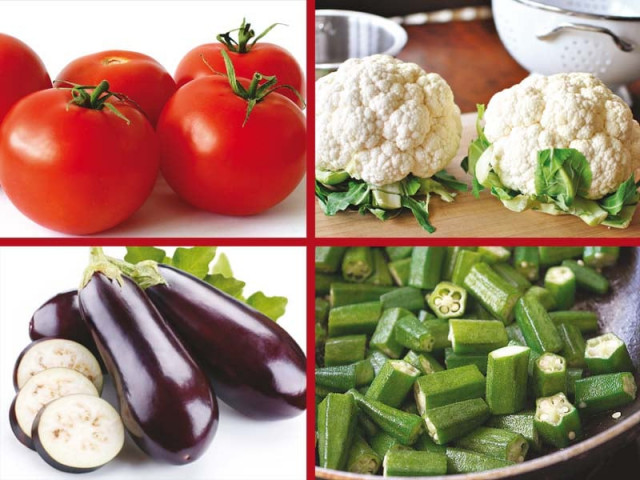7 times vegetables can be downright bad for your health
Discover the dark side of your healthy foods

7 times vegetables can be downright bad for your health
You have heartburn

An unidentified substance in tomatoes and tomato-based products, that include ketchup, pasta sauces, salsa dips or your favourite tamatar gosht can cause acid reflux. People suffering from digestive issues such as Irritable Bowel Syndrome (IBS) or people who are generally prone to having sensitive tummies should try eliminating tomatoes from their diet for two or three weeks to see if things feel better. Heartburn is a very common ailment experienced after a heavy or a spicy meal and we try to mask it with meds when all we can do is eliminate tomatoes.
You take blood-thinning drugs

If you take blood-thinning drugs such as asprin for cardiovascular health, it’s important to maintain steady blood levels of vitamin K. Sudden increases in this particular vitamin can lessen the effects of the drug. That means it’s important to be consistent with your vegetable intake, since this is where most of your vitamin K comes from. Try to eat similar amounts of vegetables every day. If you like veggies that are particularly high in vitamin K, such as spinach, mustard greens, and turnip greens, stick with half a cup a day, eaten at about the same time daily.
You have a history of kidney stones

One in five people who form calcium oxalate kidney stones (the most common type) have elevated levels of oxalates in their urine. If you have a history of kidney stones, limit oxalate-rich foods, such as okra or the Pakistani-fave bhindi, kids’ delight — potatoes and other veggies such as parsley (dhanya) and beets (chukhandar). An oxalate-controlled diet will help in flushing out smaller stone deposits while preventing new ones from forming. Potato chips and French fries are the main culprits to upping your chances of kidney stones so steer clear or reduce intake.
You have certain allergies

Eating certain foods may provoke an allergic reaction in people who are sensitive to everyday allergens. People sensitive to latex or certain types of pollen may have an allergic reaction to avocados. Many people sensitive to aspirin may suffer an allergic reaction to radishes or mooli, which contain salicylates, compounds similar to the drugs’ active ingredients. If you’re generally someone who suffers from allergies at least twice a month or so, should cut out radishes and avocado completely. No more guacamole for the allergy prone.
You have an inflammatory GI disorder

A chronic inflammatory disease of the intestines, especially the colon and ileum, associated with ulcers and fistulae is basically termed as Crohn’s disease. If you have ulcerative colitis or Crohn’s disease, your doctor might recommend avoiding or minimising your intake of cabbage, which contains bacteria that live naturally in the intestinal tract and cause gas and bloating. You might also want to limit your intake of other cruciferous veggies such as cauliflower, broccoli, and Brussels sprouts if they trigger symptoms. Looks like the innocent gobi ki sabzi isn’t that innocent after all. If you’re prone to stomach ulcers, eliminate the food offenders out of your diet.
You’re watching your weight

Veggies are often considered your best friends when you’re trying to win the battle of the bulge. That’s not necessarily correct, or at least with some vegetables. Be picky about eggplant-based dishes. Baigan is one of our Pakistani staples and it’s surprising that we don’t know much about it. Eggplants’ spongy texture soaks up fat. In fact, deep-fried eggplants soak up four times as much fat as French-fried potatoes. Keep calories to a minimum by baking, broiling, roasting, or stewing. If sautéing, use a nonstick pan and very little oil, because all of it will be absorbed by the veggie.
You have an underactive thyroid

Looks like the shaljam-gosht and shaljam achaar you’re consuming, is creating havoc with your system if your thyroid is underactive. Shaljam or turnips contain two goitrogenic substances, progoitrin and gluconasturtin, which can interfere with the thyroid gland’s ability to make its hormones. These compounds don’t pose a risk for healthy people who eat moderate amounts of turnips, but anyone with hypothyroidism should cook this vegetable thoroughly before consumption since cooking appears to deactivate most of its goitrogens.
Published in The Express Tribune, August 14th, 2015.
Like Life & Style on Facebook, follow @ETLifeandStyle on Twitter for the latest in fashion, gossip and entertainment.



















COMMENTS
Comments are moderated and generally will be posted if they are on-topic and not abusive.
For more information, please see our Comments FAQ